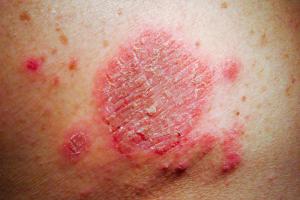Discoid eczema
Discoid eczema, also known as nummular or discoid dermatitis, is a long-term skin condition. It causes skin to become itchy, reddened, swollen and cracked in circular or oval patches. See your pharmacist or GP if you think you may have discoid eczema so they can recommend a suitable treatment.
Symptoms of discoid eczema
Circular or oval patches of eczema
Circular or oval patches of eczema can affect any part of the body, although they don't usually affect the face or scalp.
They start as a group of small red spots or bumps on the skin which join up to form larger pink, red or brown patches that can range from a few millimetres to several centimetres in size.
Blistering
At first, these patches of eczema are often swollen, blistered (covered with small fluid-filled pockets) and ooze fluid.
Itchiness and pain
The patches also tend to be very itchy, particularly at night.
Dry, crusty, cracked and flaky skin patches
Over time, the patches may become dry, crusty, cracked and flaky. The centre of the patch also sometimes clears, leaving a ring of discoloured skin that can be mistaken for ringworm.

You may just have one patch of discoid eczema, but most people get several patches. The skin between the patches is often dry.
Patches of discoid eczema can sometimes become infected.
Signs of an infection can include:
- the patches oozing a lot of fluid
- a yellow crust developing over the patches
- the skin around the patches becoming red, hot, swollen, and tender or painful
- feeling sick
- chills
- feeling unwell
When to get medical advice
See your pharmacist or GP if you think you may have discoid eczema so they can recommend a suitable treatment.
You should also seek medical advice if you think your skin may be infected. You may need treatment.
Your GP should be able to make a diagnosis just by examining the affected areas of skin. In some cases they may also ask questions or arrange some tests to rule out other conditions.
Your GP may refer you to a dermatologist (a doctor who specialises in managing skin conditions) if they're unsure of the diagnosis or if you need patch testing.
Causes of discoid eczema
The cause of discoid eczema is unknown, although it may occur as a result of having particularly dry skin.
Dry skin means your skin can't provide an effective barrier against substances that come into contact with it. This could allow a previously harmless substance, such as soap, to irritate (damage) your skin.
It's important to look carefully at all the chemicals in cosmetics and toiletries that may have come into contact with your skin.
Contact dermatitis, a type of eczema caused by coming into contact with a particular irritant, may have a role in discoid eczema.
Some people with discoid eczema also have a history of atopic eczema, which often occurs in people who are prone to asthma and hay fever.
However, unlike atopic eczema, discoid eczema doesn't seem to run in families.
Other possible triggers
An outbreak of discoid eczema may sometimes be triggered by a minor skin injury, such as an insect bite or a burn.
Some medicines may also be associated with discoid eczema, as patches of eczema can appear in people taking:
- interferon and ribavirin – when they're used together to treat hepatitis C
- tumour necrosis factor-alpha (TNF-alpha) blockers – used to treat some types of arthritis
- statins (cholesterol-lowering medication) – which can cause dry skin and rashes
Dry environments and cold climates can make discoid eczema worse, and sunny or humid (damp) environments may make your symptoms better.
Treating discoid eczema
Discoid eczema is usually a long-term problem. But medications are available to help relieve the symptoms and keep the condition under control.
Without treatment, discoid eczema can last for weeks, months or even years. It may also keep recurring – often in the same area that was affected previously.
Treatments used include:
- emollients – moisturisers applied to the skin to stop it becoming dry
- topical corticosteroids – ointments and creams applied to the skin that can help relieve severe symptoms
- antihistamines – medications that can reduce itching and help you sleep better
There are also things you can do yourself to help, such as avoiding all the irritating chemicals in soaps, detergents, bubble baths and shower gels.
Additional medication can be prescribed if your eczema is infected or particularly severe.
Occasionally, areas of skin affected by discoid eczema can be left permanently discoloured after the condition has cleared up.
Other types of eczema
Eczema is the name for a group of skin conditions that cause dry, irritated skin. Other types of eczema include:
- atopic eczema (also called atopic dermatitis) – the most common type of eczema, it often runs in families and is linked to other conditions such as asthma and hay fever
- contact dermatitis – a type of eczema that occurs when the body comes into contact with a particular substance
- varicose eczema – a type of eczema that most often affects the lower legs and is caused by problems with the flow of blood through the leg veins
The information on this page has been adapted from original content from the NHS website.
For further information see terms and conditions.